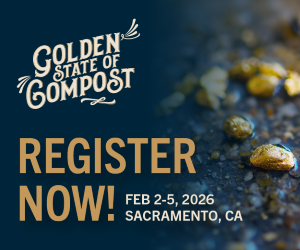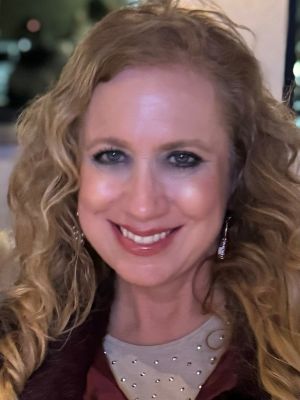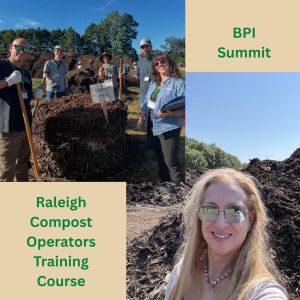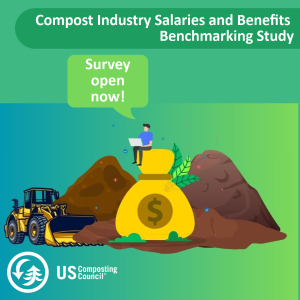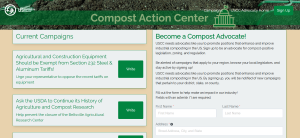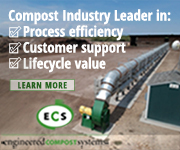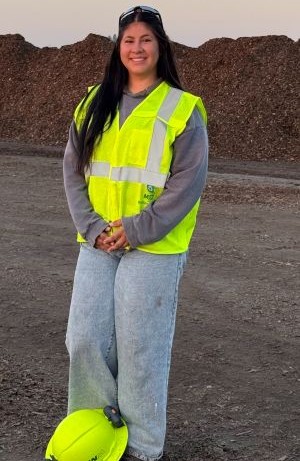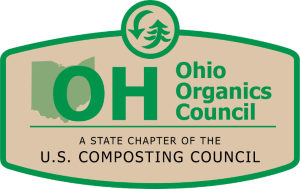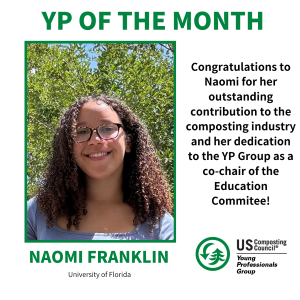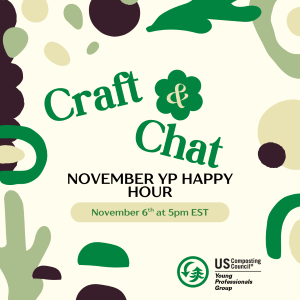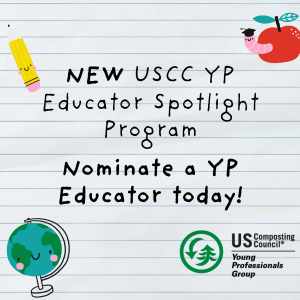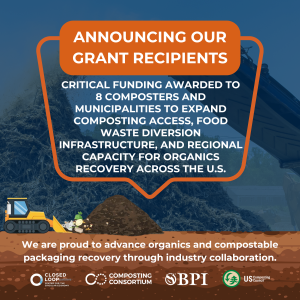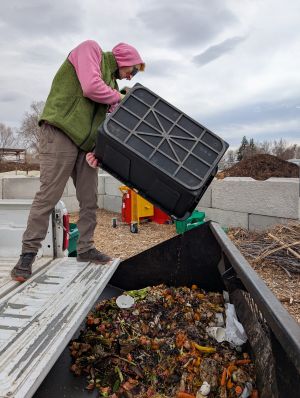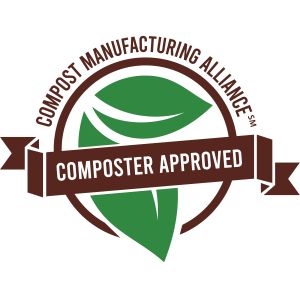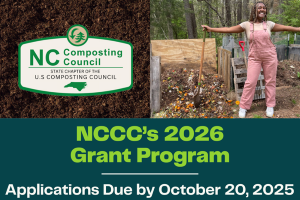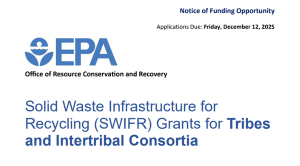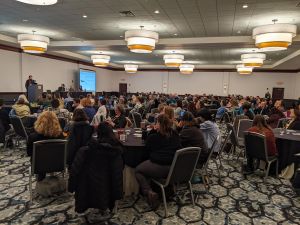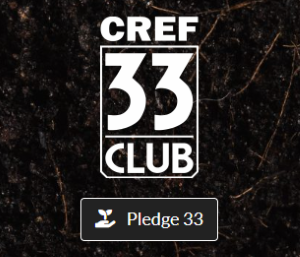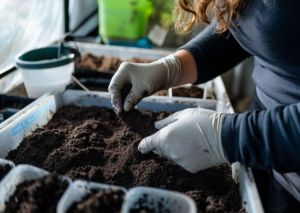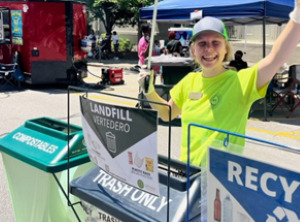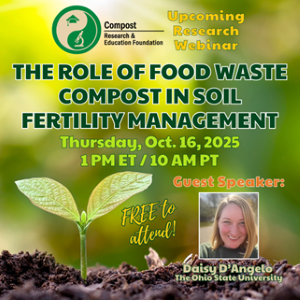 |
|||||||||||||||||||||||||||||||||||||||||||||||||||||||||||||||||||||||||||||||||||||||||||||||||||||||||
| Past Issues | Subscribe | Send to a Friend | compostingcouncil.org | |||||||||||||||||||||||||||||||||||||||||||||||||||||||||||||||||||||||||||||||||||||||||||||||||||||||||
Linda Norris-Waldt
Executive Director
Do you ever worry about feedstock competition when it comes to food waste?
Well, consider this: our share—the inedible part—of the food scrap pie is 22%, or 13.8M tons per year, of the 62.5M tons of food scraps disposed annually.¹
That’s a pretty hefty total, unfortunately or fortunately, depending on your vantage point, and we share that inedible food pie with others, such as animal feed and anaerobic digestion. But even so, there is plenty of inedible food to go around¹.
That’s an important fact to recognize when you consider that food scrap composting infrastructure continues to be woefully inadequate. While it is growing consistently, it is growing slowly. From 2023’s BioCycle/Closed Loop Partners Study: “Using the maximum tons of food waste composted based on our 2023 data (2.6 million tons), today’s composting infrastructure processes up to 4% of the 66 million tons of total food waste generated annually in the U.S. (Source: U.S. EPA). USCC’s estimates are that we would need 300-500 facilities nationwide to:
• Convert from collecting only yard trimmings/green waste (the majority of facility feedstocks) by expanding into Tier 2/3 facilities with permits.
• Incentivize/start up new facilities, especially in areas where we have “compost deserts.”²
Back to that 13.8 million tons of inedible food scraps that we are still tackling. Our throughput study showed only 643,528 tons of food scraps processed with a 36% response rate—we've got a long way to go, baby!
Some people have wondered why USCC supports things such as the Food Date Labeling Act, which would clarify that if a food business includes a date label, they must select between one of two options: a quality label indicating estimated peak freshness (using the phrase “BEST If Used By”) or a discard label indicating when a food product should be discarded (using the phrase “USE By”). By clarifying date labels, we can save consumers money and ensure that perfectly edible food is reaching people who need it instead of being prematurely discarded.
Over the past month, the USCC has released a lot of information about COMPOST2026, the upcoming gathering of the composting industry in Sacramento, California. We want to compile all the need-to-know information here so that you have no trouble finding everything you need to know about attending COMPOST2026!
Early Bird Pricing lasts until November 20th!
Register now before early bird pricing ends!
USCC member registration: $780
Non-member registration: $980
Learn about pre-conference programming, volunteering opportunities, conference scholarships, the in-person certification test, and demo day equipment registration by clicking below!
The USCC is thrilled to welcome Jayne Edwards as our new Marketing and Communications Manager. Joining the team with an extensive background in strategic communications and content leadership, Jayne will drive the USCC’s national brand recognition and advance its critical mission.
With over 15 years of experience leading strategic marketing initiatives for diverse organizations, including global corporations like Cisco and Microsoft, and leading trade and professional societies, she is uniquely positioned to enhance the USCC's reach and impact.
Jayne’s expertise includes developing and implementing comprehensive marketing plans, managing brand compliance, and coordinating high-level media relations. This experience will be vital in translating the complex technical work of the USCC into compelling, digestible stories for a wider audience, from policymakers to compost end-users.
Over the past month, USCC staff members left the office to attend major gatherings of composting professionals. Through these in-person events, our staff was able to deepen their knowledge of the composting field and connect with composters across our membership base.
In September, our Member Services Coordinator, Ksenia, attended the Compost Operations Training Course in Raleigh along with over 30 industry professionals. Attending a COTC is a rite of passage for a USCC staff member; they provide the ultimate opportunity to understand and learn how to better serve the needs of our members. The Raleigh COTC was exceptionally well-organized thanks to the Compost Research and Education Foundation (CREF) and the NC Composting Council.
The US Composting Council has launched the Compost Industry Salary and Benefits Benchmarking Study, the first of its kind for our industry.
Already, the many companies, nonprofits, and municipalities in the composting industry who provided us with a point of contact for the study have received instructions for participation and have begun filling out the survey. We want to encourage all of our members to join them in helping us create a robust data set for this study. If you and your team would like to help in this landmark study, you can sign up today! The first 30 participants will be entered into a raffle for a $100 Visa Gift Card!
The USCC’s advocacy program works in service of our mission to advance the Composting Industry for our members. To do that, we have to constantly be monitoring what is going on at the State and Federal levels and bringing the important issues affecting the composting industry to the attention of our members so they can assist us in responding to these issues!
The last few months have been a perfect example of this, as we have been using a variety of methods to inform our members of what is going on at the State and Federal levels and requesting their involvement to hopefully effect changes in federal and state actions.
We’d like to congratulate Dulce Delgadillo for completing her professional certification process to become a Certified Compost Operations Manager™!
Dulce is the Organics Operations Supervisor at WM South Valley Compost Facility in Tulare, California, and has been with WM for two years.
When asked why she pursued USCC Professional Certification, Dulce said, “Growing up, I always knew I wanted to do something to help our environment so that future generations can enjoy it just as much as I do. I can truly say I love what I do, and being able to share my passion with my team and community means so much to me. I pursued my USCC Professional Certification because I wanted to prove to myself that this is what I was meant to do! I love that I can be a part of a group that shares my same passion and love for composting—a group where we continue to push each other to be better and where it's ok to ask for help!”
Please join us in congratulating Dulce on her CCOM™ professional certification!
The Ohio Organics Council (OHOC) Annual Conference is back! Join industry professionals, innovators, and policymakers for a day filled with insightful presentations, engaging breakout sessions, and valuable networking opportunities. This is a must-attend event for anyone passionate about advancing organics recycling and composting in Ohio.
Topics to be covered include advocacy initiatives & state of the industry updates, animal & human remains composting, biochar innovations, PFAS challenges & solutions, compostables best practices, and much more!
We are thrilled to highlight Naomi Franklin as October’s YP of the Month!
Naomi got into the compost world shortly after rediscovering her interest in gardening back in 2023. Naomi had been working as a 10th-grade Biology teacher at a low-income school when she became aware that her students genuinely didn’t know that food was grown. This sparked Naomi , in collaboration with another teacher in her department, to apply for some grants to install a food forest and butterfly garden on the school grounds. After being thrown back into the fray of gardening, Naomi ended up becoming a Master Gardener Volunteer (MGV). While she was going through the MGV program, Naomi connected with a professor at the University of Florida (UF) that was working on a compost-focused project. Under their advisement, Naomi applied for admittance into UF’s environmental horticulture master’s program, where she conducted research evaluating the viability of kenaf (Hibiscus cannabinus) composts for use in the production of horticultural crops.
The next Young Professionals Virtual Happy Hour is coming up in a few weeks!
When: Thursday, November 6th, 5:00 PM EST
Where: Zoom
Get in the holiday spirit by creating crafts that, once you are done, can be composted! Join us for crafting and chatting about all things compost during the holidays at our Happy Hour on November 6th.
Find craft ideas here (some will require prep prior to the event). We hope to see you there!
The USCC Young Professionals (YP) Group is launching a new monthly spotlight for educators around the US! Each month, we will feature a YP educator who is involved in composting at their school or organization in both the USCC monthly newsletter as well as on our group's LinkedIn Group!
Established in 2013, the USCC YP Group engages future industry leaders with the US Composting Council’s membership community through networking and career development opportunities. According to USCC, a YP is anyone between 21 and 35 years old or has less than five years of experience.
If you would like to nominate yourself or someone you know to be featured as an upcoming USCC YP Educator Spotlight, fill out the form linked below.
Are you a passionate young professional looking to connect with like-minded individuals in the composting industry? Look no further! We invite you to join our vibrant and engaging Slack community.
By joining our Slack, you'll have the opportunity to:
It's easy to get started! Simply click the button below to join our Slack community and start connecting with fellow Young Professionals today.
USCC Member Closed Loop Partners, through their Composting Consortium, has announced the selection of municipal and compost producer-led projects across the U.S. that will receive grant funding to advance composting infrastructure and the recovery of food-contact compostable packaging. These grants were made possible through technical support from the USCC and funding support from the Biodegradable Products Institute. Eight diverse projects have been awarded grants. You can read the full press release from Closed Loop Partners, detailing the project and all awardees, by clicking below!
USCC Member Compost Queen is launching a one-year food waste composting pilot program in the City of Fort Collins, Colorado. Through collaboration with the City of Fort Collins and funding through the City’s Disposable Bag Ordinance Fees, the program will be able to provide curbside food waste collection for up to 600 residents and 20 businesses.
Compost Queen works with local farmers to operate small-scale, distributed composting sites, ensuring that the nutrients from locally generated organic waste can return to local soils. The organization also hosts biannual compost pickup days where program participants are invited to their sites to collect compost generated from their organic waste. Compost Queen has been operating in the Fort Collins area since 2018, and this deep experience of the composting landscape in the area will set the program up for success.
On October 1, USCC member Beaufort County Solid Waste and Recycling launched its new Compost Education Pilot Program and introduced the County’s new composting mascot, Mossy.
According to the County, Mossy was developed with input from local cultural leaders “to reflect the Lowcountry’s natural beauty and heritage while encouraging residents to embrace sustainable practices.” The character will be utilized in educational campaigns at the County’s convenience centers, where residents will be encouraged to separate compostable materials from other waste streams. Mossy will engage the public about the importance of composting through engaging forms of storytelling and culturally situated outreach.
The educational campaign is a part of Beaufort County’s USDA-funded composting pilot program. The County has extensive goals for the pilot, which focus on growing access to composting through expanding drop-off locations and growing awareness of composting through educational campaigns and community outreach. The County has purchased an in-vessel composting unit, which will be the first of its kind to be operated by a South Carolina government entity.
USCC member Compost Manufacturing Alliance (CMA), along with Myno Carbon and Washington State University (Puyallup research campus), are now taking submissions (extended deadline for submissions is November 25, 2025) to launch a field study to evaluate how adding biochar to compost feedstocks impacts the disintegration of certified compostable products. Two parallel aerated static piles, one treated with 15% biochar and one control pile, will process tagged products side-by-side to compare disintegration results in a modern ASP system.
The North Carolina Composting Council (NCCC) is offering three grants of $1,000 for individual or group projects that are furthering composting, compost use, or compost education in North Carolina. The project cannot be for home use and must benefit a community or the industry. Projects can include anything from educational materials to materials for composting units to university studies. Grant applications are due by October 20th, 2025. See below for more details.
From the Environmental Protection Agency: “The Solid Waste Infrastructure for Recycling (SWIFR) grant program will assist local waste management authorities by supporting improvements to local post-consumer materials management, including municipal recycling programs, and assisting local waste management authorities in making improvements to local waste management systems.
The entities eligible to apply for this grant are:
- Indian Tribes, as defined in 33 U.S.C. 4201 and section 4 of the Indian Self-Determination and Education Assistance Act (25 U.S.C. 5304), which includes Alaskan Native Villages and Alaska Native Corporations and former Indian reservations in Oklahoma, as determined by the Secretary of the Interior, and
- Intertribal consortia, consistent with the requirements in Title 40 of the Code of Federal Regulations Section 35.504(a).”
The 12th Annual NYS Organics Summit will be held April 14-16, 2026, at the Marriott Syracuse Downtown in Syracuse, NY. This annual event brings together more than 200 industry professionals from across the state for two and a half days of informational programming, networking, workshops, tours, and more, with the goal of advancing sustainable organics management throughout New York State. Session and/or speaker abstracts can now be submitted via this online form. Abstracts are due by Friday, October 31st. Questions about the NYS Organics Summit can be sent to NYSOrganicsSummit@nysar3.org.
The NYS Organics Summit is hosted by the NYS Association for Reduction, Reuse, and Recycling (NYSAR3), with support from the NYS Department of Environmental Conservation (DEC) and the Institute for Sustainability Engagement (ISE) at Syracuse University.
For 33 years, CREF has worked to advance compost research, training, and public awareness. From funding scientific studies and training operators to offering scholarships and leading International Compost Awareness Week (ICAW), CREF helps make composting a solution for healthier soil, cleaner water, and cleaner air.
To celebrate this milestone, we created the CREF 33 Club. By pledging $33 a month, members support CREF’s three pillars of impact: earth, water, and air. These pillars reflect the many ways compost improves the environment and strengthens communities.
The Compost Research & Education Foundation (CREF) continues to make much-needed updates to the Test Methods for the Examination of Composting and Compost (TMECC). We’re excited to share our recent Phase I progress; we have several key updates and current undertakings that we would like to highlight.
We are currently:
• Investigating critical details for standardization and quality control:Expanding ICP-AES protocol details in the phosphorus and potassium chapters.
• Standardizing and clarifying the drying protocols in the nitrogen chapter. • Modernizing the text to update and standardize the now widely-used combustion method for total nitrogen. • Updating the humic and fulvic acid methods with current understanding of these molecules and better aligning the protocols with those used by the International Humic Substances Society. • Incorporating reviewer comments into the electrical conductivity chapter. • Addressing laboratory feedback and suggestions on current STA methods, including the Phase I updates.
• Presenting TMECC updates at USCC state chapter meetings to raise awareness of our goals
International Compost Awareness Week (ICAW) is the largest and most comprehensive education initiative in the compost industry, celebrated across more than 40 countries. Each year, thousands of people take part by hosting events, sharing resources, and spreading the word about the benefits of compost. One of the highlights of ICAW is the annual poster and bookmark contests, where creativity meets compost education.
The ICAW theme for 2026 is “Compost! Feed the Soil that Feeds Us,” chosen to align with the United Nations Sustainable Development Goal “Life on Land.” We are excited to announce that submissions are now open for the 2026 ICAW poster and bookmark contests.
Come learn with us at this webinar, which features the research findings of Daisy D’Angelo, CREF University Scholarship recipient. Daisy is a Ph.D. candidate with The Ohio State University’s Department of Food, Agriculture, and Biological Engineering.
Daisy’s research examines the role that food waste compost can serve in establishing and maintaining healthy soils, specifically as a tool for better managing nutrient usage. Findings from field trials in Florida sand and Ohio clay-loam soils reveal compost’s potential to supplement fertility inputs while supporting strong crop performance.
Don’t miss this chance to gain fresh insights into compost’s role in soil health—register today to secure your spot.
Christine Kiernan, Reuters
NEW YORK, N.Y.—This year, New York City launched a city-wide household food scrap collection program and mandated the separation of organic wastes from the landfill waste stream for all residents. A large portion of that waste, along with city-collected yard waste, is processed at the Staten Island Composting Facility, operated by USCC Member Denali. This year, the Department of Sanitation was able to give back over 6 million pounds of compost to New York residents.
Kevin Beaty, Denverite
Denver, CO—Denver's “Waste No More” law, first approved by popular vote in 2022, has officially set a timeline for its enforcement. The law will create a suite of recyclable and organic waste diversion regulations across the city, applying to building owners, restaurants, and events. Enforcement will begin in September of 2026; learn about the full constellation of upcoming rules in the article below.
Waste Today
The Compostable Field Testing Program (CFTP) has raised $68,000 to continue the crucial research that the study is producing. The program, led by the Compost Research and Education Foundation and BSIbio Packaging Solutions, is an international, open-source research platform that allows composters to contribute data on the disintegration of compostable products at their composting sites using standardized testing methods. The additional funding will help the Program expand research into new areas and continue delivering critical data to the composting industry through 2026 and 2027.
Shore News Network
Trenton, N.J.—New Jersey recently passed Assembly Bill 4085, legalizing natural organic reduction, commonly known as human composting, in the state. The New Jersey State Board of Mortuary Science will oversee the licensing and oversight of facilities approved to perform natural organic reduction, while the Department of Environmental Protection will maintain a list of cemeteries approved to accept composted human remains. With the passing of Assembly Bill 4085, New Jersey becomes the fourteenth state to legalize this practice.
|
|||||||||||||||||||||||||||||||||||||||||||||||||||||||||||||||||||||||||||||||||||||||||||||||||||||||||


